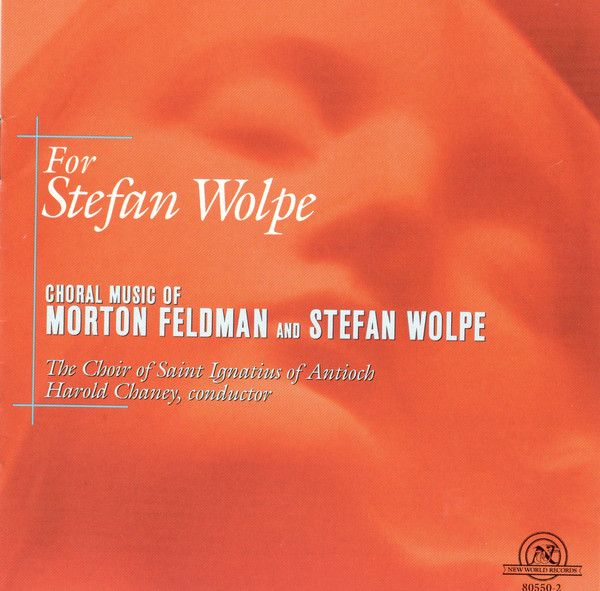
 |
|
 |
Format: CD Label & Cat.Number: New World Records 80550-2 Release Year: 2000 Note: incl. WOLPE's early Marxist pieces "Zwei Chinesische Grabschriften" (1937), "Four Pieces for Mixed Chorus" (1955), FELDMAN "Christian Wolff in Cambride" (1963), "Chorus and Instruments" (1967), "For Stefan Wolpe" (1986); incl. extensive booklet explaining the historical and cultural connection between both composers
Price (incl. 19% VAT): €13.00 Warning: Currently we do not have this album in stock!
More Info"Choral Music of Morton Feldman and Stefan Wolpe.Choir of St. Ignatius of Antioch, New York City / Harold Chaney, conductor Benjamin Ramirez, Thomas Kolor, percussion Stephen Foreman, tuba Stefan Wolpe (1902–1972), one of the great teachers in twentieth century music, is also now recognized as one of its most significant composers. His Two Chinese Epitaphs, composed in Jerusalem in 1937, illustrates the composer’s deep allegiance to socialist issues. He wrote the work swiftly and in anger, just after learning that the Basque town of Guernica had been bombed by the Fascists the previous week. He chose to set two poems by Louise Peter that decry, in a few short phrases of stark imagery, the atrocities committed against oppressed workers. The Four Pieces for Mixed Chorus (1955) were composed for a contest sponsored by the government of Israel. It is a setting of four Hebrew texts—three from the Bible and one from Israeli poet Gershon Shofman. All the texts express hope for the new nation of Israel. Morton Feldman (1926–1987) studied with Wolpe for several years and was deeply influenced by his modernist aesthetic, particularly his interest in the visual arts. For Stefan Wolpe (1986), for chorus and two vibraphones, is Feldman’s tribute to his venerated teacher. It alternates between vocal and instrumental passages. The two never intermingle, even though Feldman lets the vibraphones ring into the voices. As is characteristic of his late music, the piece combines the quiet, atonal, austere textures of his earlier music (of which Christian Wolff in Cambridge [1963] and Chorus and Instruments II [1967] are stellar examples) with several new elements—greater duration, minimalist repetition, and bigger gestures. All five works are making their first appearance on CD. An indispensable addition to the discographies of both composers." [label info] www.newworldrecords.org |
| © 2007 Drone Records | | Celler Strasse 33, 28205 Bremen, Germany | Privacy and cookies policy | Impressum / Allgemeine Geschaftsbedingungen / Haftungsausschluss | Links to the scene |